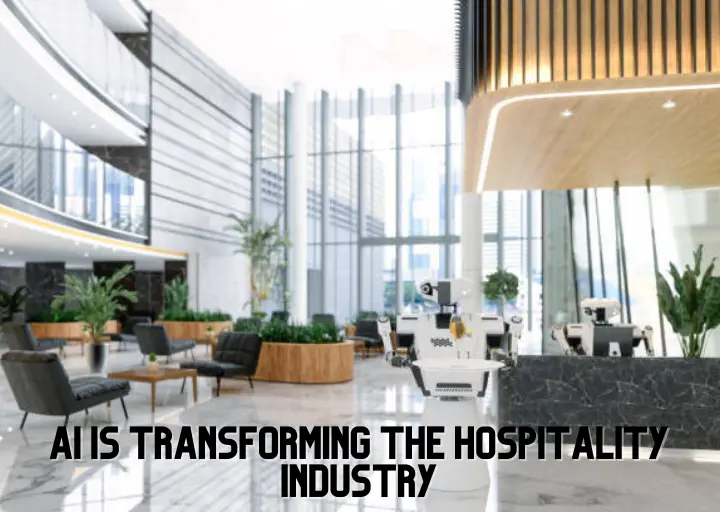The hospitality industry is one of the largest markets at present. If you go by the bookish definitions, the industry comprises businesses offering food, dwelling places, and entertainment. However, the definition has changed from what it used to be in earlier times. Currently, the hospitality industry comprises five main domains. Following food and beverage are lodgings, travel, tourism, recreation, and event companies.
From the name itself, you can understand that businesses belonging to these market sectors have to deal with customers daily. Customers may also vary from young to old, with different cultures, ethnicities, origins, lineages, and economic classes. With such a wide consumer base, a hospitality business can’t provide an excellent customer experience based on a single strategy.
Therefore, it has adopted several new concepts, based on the technological context, to assist businesses to boost growth and revenues. Artificial intelligence can potentially revolutionize the hospitality industry, even if only for good.

How AI Impacts Hospitality Industry
The following are some of the major areas where artificial intelligence can positively impact the hospitality industry.
Automated booking through AI chatbots
In the hospitality industry, one of the major uses of artificial intelligence is automated booking and cancellation via chatbots. Chatbots are AI-powered applications that can be integrated with the business website or application. The system uses machine learning and natural language processing to understand what the customer is saying.
Thanks to such software, users can now book tickets over reservations in your business through the chatbot. There won’t be any phone calls or busy lines to demean the customer service and experience from your end.
AI-enabled concierges at hotel entrances
In hotels and restaurants, concierges assist guests with directions and provide tour guides, as well as improve the overall customer experience. However, one problem with physical concierge is the lack of understanding of customer interpretation and behavior. This is where artificial intelligence enters the hospitality industry.
Artificial intelligence-based concierge software provides a better and more intuitive user experience, simplifies customer service inquiries, and improves the overall interaction with your customers. In the hospitality industry, these factors will help you outshine your competitors.
Security check-ins with the face recognition system
Artificial intelligence has found its maximum use in security and privacy systems. Input data into the software allows it to recognize a person based on its design. For example, in a face recognition system, the camera captures the picture of a person and stores it in the database. Let’s say the same person stands in front of the camera again after a couple of days or hours.
The AI-based software will extract data from the database and map it with the camera’s image. If the mapping is correct and all the nodes are in sync, you will be allowed to cross the security checkpoint at different hospitality businesses.
Enhanced lodging experience with real-time customer feedback
The entire hospitality industry depends on customer feedback for bringing changes in their existing operations or introducing new services and functionalities. This is why businesses involved in the lodging domain have embraced artificial intelligence software to know what their customers are thinking about their services. The software captures customers’ feedback in real-time and sends it to the analytical algorithm.
Now, it is the algorithm’s job to find out trends and patterns in the feedback and generate a report on user satisfaction and experience. As all data sets are collected from real-time customer feedback, the interpretation and forecasting are accurate and precise. This will help you understand what areas of your lodging business need more attention and upgrades.
Personalized marketing for more revenues
The consumer market at present is very dynamic. Therefore, it isn’t easy to understand the pattern or trend of customer behavior over time. This is where artificial intelligence software will come in concerning the hospitality industry. With the help of proper analytical and forecasting software, you can know what kind of services your customers expect from you, the facilities or benefits they seek from different companies belonging to the same hospitality domain, and so on.
With this complete knowledge set, it won’t be difficult for you to devise personalized marketing strategies and target smaller groups of customers with 100% returns on investment (guaranteed). In addition, it will help you understand how to modify your current services or plan for new ones based on customer demands and the supply chain market.
AI-powered software for dynamic pricing forecast
Another major area where artificial intelligence will play a very crucial role in the coming years is the pricing sector. When hospitality businesses mix the pricing model for their services or products, they have to consider many factors. These factors determine whether the decisions are taken in favor of targeted customers or not. For example, let’s suppose a hotel once gives discounts to their new customers.
The management team will use dynamic pricing software based on artificial intelligence to check if the time is right for giving discounts or not. It can be seasonal discounts, or it can be some promos based on events and celebrations. The pricing model will help you set the perfect cost chart that will benefit both the business and the customers.
Conclusion
Since the introduction of artificial intelligence, machine learning, and natural language processing, several businesses and industries have undergone a wide range of transformations and revolutions. Similarly, the hospitality industry is also walking in the same footsteps, with the main goal of bringing changes in existing operations and introducing modern services and facilities.